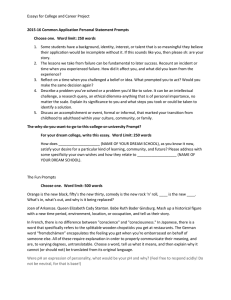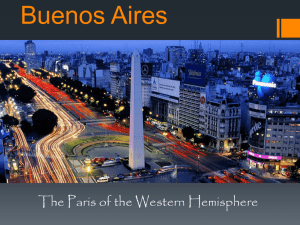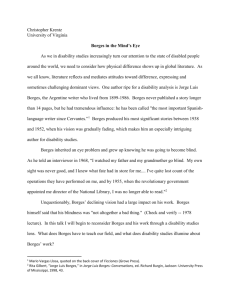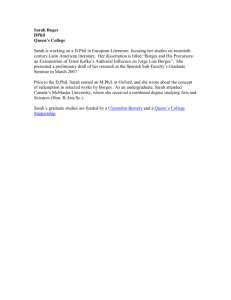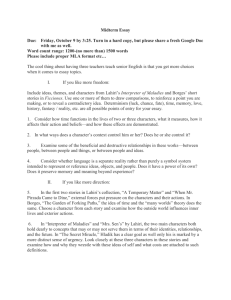Jorge Luis Borges (1899-1986): A writer of short stories.
advertisement
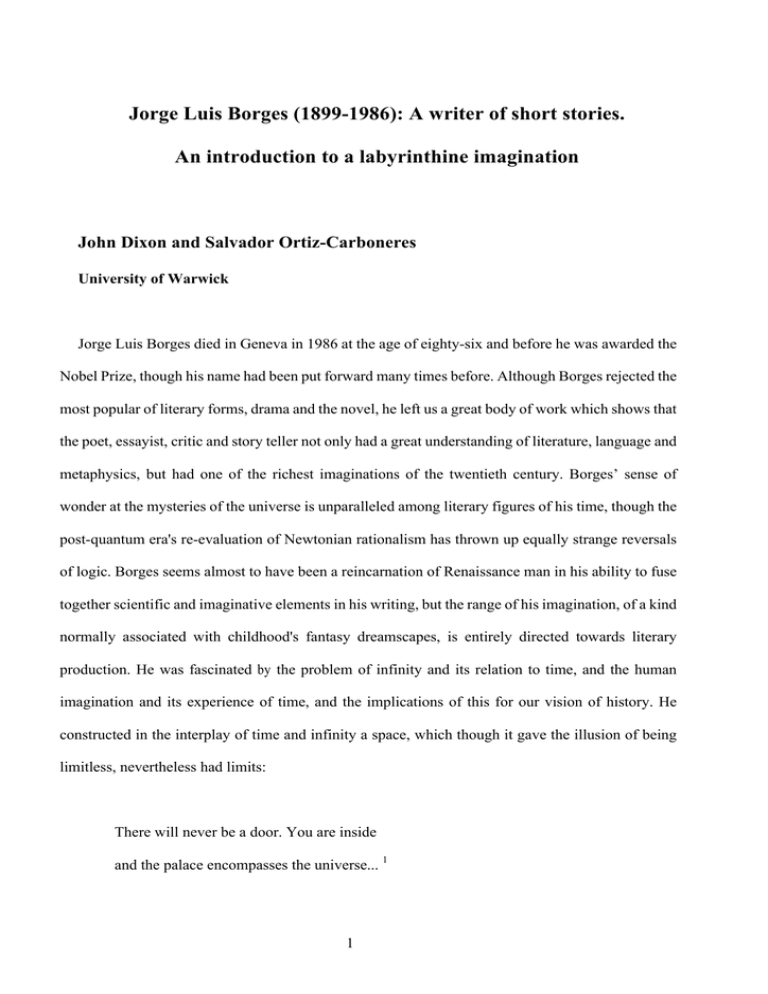
Jorge Luis Borges (1899-1986): A writer of short stories. An introduction to a labyrinthine imagination John Dixon and Salvador Ortiz-Carboneres University of Warwick Jorge Luis Borges died in Geneva in 1986 at the age of eighty-six and before he was awarded the Nobel Prize, though his name had been put forward many times before. Although Borges rejected the most popular of literary forms, drama and the novel, he left us a great body of work which shows that the poet, essayist, critic and story teller not only had a great understanding of literature, language and metaphysics, but had one of the richest imaginations of the twentieth century. Borges’ sense of wonder at the mysteries of the universe is unparalleled among literary figures of his time, though the post-quantum era's re-evaluation of Newtonian rationalism has thrown up equally strange reversals of logic. Borges seems almost to have been a reincarnation of Renaissance man in his ability to fuse together scientific and imaginative elements in his writing, but the range of his imagination, of a kind normally associated with childhood's fantasy dreamscapes, is entirely directed towards literary production. He was fascinated by the problem of infinity and its relation to time, and the human imagination and its experience of time, and the implications of this for our vision of history. He constructed in the interplay of time and infinity a space, which though it gave the illusion of being limitless, nevertheless had limits: There will never be a door. You are inside and the palace encompasses the universe... 1 1 On the one hand Borges was attracted by the idea of closed spaces which were interlocking, like a Chinese puzzle (the skull, the library, rooms, as metaphors for larger concepts like the world, the universe), and on the other, time, which provided open-endedness, elasticity. As Manuel Benavides noted in his essay Borges y la Metafisica, 'We dream of infinity, but attaining it - in space and time, in memory and consciousness - would destroy us.' 2 The literary imagination allows for abstract concepts like time to be welded to our experience of physical reality through both the materiality of text and its fluid symbolism - in fiction we expect to encounter the manipulation of time and allow the author great freedom with it - we ask only for internal consistency. Historical reality, however, does not always conform to literary reality. Borges believed that historical truth is not a product of what actually happened as much as what we consider happened, and in this he seems to be in line with current re-evaluations of 'History' as a monolithic concept. The dividing line between his essays and his fiction is not always clear, and Borges, as he says in the prologue to his Historia Universal de la Infamia /Universal History of Infamy), likes to add a new twist to some strange stories. At the same time his searches lead him to explore the reality of existence in its entirety, and, like the surrealist painter Salvador Dalí, he is drawn to express its paradoxes through symbolism. Reality, for Borges, is an illusion. Only literature seems to point to a higher reality, one beyond the scope of earthly perception, and as such it becomes a kind of secular religion for him. 'His whole life's work is a constant questioning about the relative power of poetry and philosophy, of the image and the idea. Language, literature and philosophy are concerned with the same question: Can we go beyond language, literature, consciousness, and representation and attain the essential being of the world and of the self!'3 This points to a tragicomic response: Borges at once feels trapped by the illusory nature of the material world, and at the same time his understanding is a source of pleasure God really does play dice. All literature is inter-connected for Borges, who anticipates post-structuralism's exploration of inter-textuality by some years - the continuing unfolding of stories from earlier ones points to future and past infinities. Story-telling is tied up with creation, which is our enduring mystery both within and outside the Christian tradition. By the same token, 2 dreams, which are fictions of a different order, are shared among us: '… one person's dream is part of the memory of all.'4 Borges was a prolific writer, some of his best known works being the collections of stories in Ficciones (Fictions), El Aleph (The Aleph) and Historia Universal de la Infamia (Universal History of Infamy). In addition he wrote a vast number of essays and prefaces as well as poetry. He collaborated with Adolfo Bioy Casares on anthologies of detective fiction - yet he was fascinated by the structure of narrative and the manipulations of the plot for their own sakes. Rather than accepting the convention, particularly strong in detective fiction, of the author simply creating a puzzle for the reader to solve, Borges was more attracted to the idea that fiction could take on a life of its own and manipulate both the author and the reader - in this he echoed the work of Irish comic writer Flann O'Brien, and the explorations in fictional devices of the nouveau roman.. Borges was often preoccupied with his own identity, but not from an egotistical stance, rather from an existentialist self-examination of the paradoxes surrounding his relation to his own writing, which constituted a public projection of a mask Borges, the name, a fixed thing or point of reference, standing for this ultimately immaterial and fluid literary production. In this respect Borges could be compared to the great Portuguese modernist figure Fernando Pessoa, who adopted different identities or masks for different writings, in an almost schizoid interplay of 'fake' personalities produced by the same pen. The poem My Whole Life (from Luna de Enfrente/ The Moon Above, 1925) is interesting in this regard because it foreshadows Borges' final period. Borges the man lets Borges the writer take the stage in classical mood, serene and stoical: 'I have relished numerous words. I deeply believe that is all and I will neither see nor accomplish new things'5 By setting limits on human experience we set limits on life and on the world. Borges seems to have seen himself as a monk-like figure, dedicating his life to understanding while placing 3 restrictions on earthly experience. The simplicity of his actual life contrasted with the world of his imagination which was fed by an endless consumption of books - always with the sense that the reality of the imagination has a higher value than that of the conventional, material, kind. He had a sense that it was the complete surrender to the world and acceptance of our fate which enables us to confront the power of death. In The Universal History of Infamy Borges confronts destiny in a series of experimental narrative essays. In El Toro/ The Bull the masked figure is a symbol of immortality. Removal of the mask leads to blindness. 'At the head of the realm of the gods of H'akim' - Borges wrote - 'there is a ghostly god. This imperious divinity lacks its origin, name and face ....'6 From 1935 to 1939 Borges stopped writing prose fiction. On Christmas Eve 1938 Borges had an accident. Suffering from deteriorating sight, he hit his head on an open window going upstairs. This accident, which blinded him, was a watershed in his literary career. In 1949 El Aleph/The Aleph was published, a series of fantastic stories which had already been published in various magazines and dailies. Otras Inquisiciones /Other Inquisitions (1952) was the second version of an earlier draft that had been set aside. Perhaps these works of fantasy were a way of escaping from the nineteen-forties, a bleak period full of horrors; an escape from reality into fiction, just as Cervantes had done with Don Quixote, fleeing from the reality of the Spain of his time. Borges was not blind to the political realities of the world in which he lived, but refused to give them the precedence over the destinies of ordinary human beings that they demanded. He could see that despite the orientation towards fact and materialism that conventional politics encouraged, there was not only continual manipulation of public opinion, particularly under the Peronist dictatorship he knew in his native Argentina, but in South America in general a curious inter-weaving of fact with symbolism, myth, and a strong appeal to escapist fantasies and hero-worship. In this Latin-American world, some of his more fantastic stories may have been more readily accepted both as literary devices and modes of describing certain material realities than in Europe, with its strong realist traditions in the novel and its tendency towards pragmatism in real life. The reception of Borges' work has suffered in recent years as the literature of South America has often emerged against a backdrop of a series of revolutionary 4 struggles, even where the stories have been interwoven with magic, expressed as a kind of collective subconscious, and the fantasies of the individual imagination. In the context of this conflict between the political will and the private imagination, Borges may now seem too much of an ivory tower figure, cut off from his contemporaries and entirely lost in a dreamscape of his own devising. The privileged position he had by virtue of his own family background may seem to reinforce the sense that he was coolly indifferent to the material affairs of the world, though this was not true as his family suffered under the Peronist regime, just as Lorca was to fall victim to the fascists in Spain. Placing man on the metaphysical plane as he did, he could hardly find comfort in the cruelty of human existence, and in some ways he seems to share the same perspective as Samuel Beckett, though in Beckett the faint light of humanity is present even in the vast emptiness of the universe and is expressed through the human voice - the individual tragedy is played out against a wider vision of man's fate, while in Borges' stories people are fictional and often fantastic characters who live in their own perverse universe and are subject to its rules - the 'humanity' in his stories emerges less from a sense of human fallibility than from the tragicomic interplay of fiction and reality. If in some ways his world seems colder than that of Beckett it is because he delights in game playing and is sure of his own omnipotence even where he seems self-mocking, and like Nabokov or Dalí rather revels in his own genius - the reader struggles to keep up. In the story The Two Kings and the Two Labyrinths (El Aleph 1949), the destiny of man, seen as a mere mortal, is to wander in the labyrinth until the day of his death: Then he untied his bonds and abandoned him in the heart of the desert where he died of hunger and thirst. Glory be to him who does not die.7 Another of Borges' favourite themes appears in The Great Wall and the Books (Otras Inquisiciones 1952). The Great Wall is a symbol of an attempt to create an enclosed space where death does not exist, and this is bound up with the desire to overcome the passage of time: Shih Mung Ti wants to destroy the past and begin again, by burning all the books. But in the interpretation 5 of such diverse and weighty events Borges draws us into a world of probabilities. The story uses a number of expressions like 'This conjecture ... ', 'This fact suggests ... ', 'perhaps', 'maybe', 'we could infer', 'this would support', with extensive use of modals. The wall also creates a feeling of fatalism and of ghosts linked symbolically to the past which with the passage of time creates an atmosphere of confusion and uncertainty: 'The unyielding Great Wall, which now and always casts its systems of shadows over lands I shall never see, casts the shadow of a Caesar, who ordered the most reverent of nations to burn its past ...' 8 Borges always tried to covey the sense that his private life was completely separate from the world of his creations, but through his writing the writer tried to recover symbolically events from his past, and this happens frequently in the work Dreamtigers ( original Spanish tile El Hacedor, 1960), published five years after the fall of the Peronist regime. In Dreamtigers, in a mixture of dreams and reality, Borges goes back to his childhood in a garden in an area of Buenos Aires known as Palermo, where we first hear of Borges' tigers: 'Childhood passed; the tigers and my passion lapsed, but they still in habit my dreams. ' 9 Yet in this story he still cannot create the tiger he wanted to evoke, William Blake's… Tyger! Tyger! Burning bright, in the forest of the night... ' 10 The world of his childhood dreams was also full of mirrors: As a boy I knew that horror of a ghostly duplication or multiplication of reality before large mirrors.11 The great mirror on the wardrobe in his room filled his childhood nights with fear and panic. Reality fled from itself, multiplying in an infinite series of ghostly reflections, an infinity of visual echoes in which sight and mind were lost to each other. In The Veiled Mirrors (El Hacedor 1960), he is pursued by mirrors, confusing reflections with reality. In the end we do not know who we are, and 6 we lose our identity. Borges draws on his considerable erudition, and by way of Islam brings us to the paradox of reality: 'Islam affirms that on the unappealing Day of Judgement, all the perpetrators of living appearance will rise from the dead with their deeds, and it will be ordained that life will be given to them; after failing in this task, they will be delivered to eternal fire'12 Borges despised dictators, as he believed they encouraged both oppression and servility. In The Simulacrum (El Hacedor 1960), Perón and Eva are made to look ridiculous, being the product of a farce they themselves created and which continues to be played out by people who, wishing to escape the blind idiocy of their existence, come to believe in their own mythology. The man dressed in mourning was not Perón, and the blonde mannequin was not his wife Eva Duarte, but neither was Perón, Perón , nor Eva, Eva, but unknown and anonymous people (of whose secret name and true face we are ignorant) ... 13 Borges hatred and disgust of dictators re-emerges in The Dialogue of the Dead (El Hacedor 1960). The general Facundo Quiroga, the legendary figure from the book by Don Domingo Facundo Sarmiento, is introduced in this story. Borges and his family were Unitarians and their ideals and their disgust at any show of cowardice are in evidence in this story. The assassination of Quiroga by order of the dictator Juan Manuel Rosas in Barranca del Yaco will live in the memory of its people. The courage of Quiroga contrasts with the cowardice of Rosas: Thus it will be", said Quiroga, "but I have lived and died and up to the present day I have not known what fear is.14 7 The turbulent past of Argentina reappears in the story of Martín Fierro ( in the collection El Hacedor 1960). In this story there are two dictatorships, that of Rosas, under which his grandfather Acevedo lived, and that of Perón, which meant prison for his mother, his sister and one of his nephews - and a lot of bitter humiliation for himself: The second tyranny meant prison and death for many, discomfort, a taste of shame for everyday actions, and a never-ending humiliation for all.15 Yet what had started out as historical fact has now been transformed into fictional literature and dreams; dreams shared by all Argentineans. The myth of Martín Fierro, one of Borges's favourites, has been changed. Martín lives and dies in the Pampa. But his death means that Borges' story and the popular myth work together to deepen the people's memory: This that happened goes on happening for ever ...) one person's dream is part of the memory of all.16 In Inferno 1. 32, and in Borges and I (El Hacedor 1960), we see the re-emergence of the classical idea of the creation of the work as a justification of the existence and suffering of the writer: 'God revealed to him the secret purpose of his life and work in a dream; Dante, in wonderment, found out at last who and what he was and he blessed past sorrows ... ' (Inferno 1, 32). 'I shall continue to exist in Borges, not in myself ...' (Borges and I). In the fusion of human existence with the planet on which man lives and suffers, infinity is combined with the small details of the everyday. Borges rebels against the materiality of existence, and dips into parallel universes. In The Palace (El Oro de los Tigres, The Gold of the Tigers 1972) there are a number of statements that link the physical and the spiritual worlds. The symbolic language of the text concerns walls, gardens, labyrinths, libraries, prisons, which are united with other things like faces, words, voices… 8 As long as we are touched by a word or a memory we will not die. All the little things that surround us are witness to our lives, and so long as they exist, we exist. 'I know that I am not dead.' 17 Borges continually played with the idea of the instability of our experience of the world. The limitations of language as a means of dealing with conventional reality are offset in his fiction by an indulgence in the fantastic - language may be a poor or uneconomic means of communication in a conventional sense, but it allows for the free-play of the imagination, and everything in Borges' world focuses on the primacy of the imagination as a liberating force. Words open doors to new levels of interpretation. He frequently drew on ancient history to provide material for his short fiction, and went back to the roots of literature, to its mythical origins, to draw on a pool of symbolism with more universal appeal. Aspects of these stories - like his re-interpretation of the Babel story for example - were frequently re-cast in such a way as to open up new angles on their telling, or for the sheer pleasure of the puzzles they gave rise to. The fascination with puzzles was not only one of the most characteristic themes in Borges' writing, but they served a purpose as a means of engaging with the universal questions encapsulated in simple fables. Through the symbolic power of language both the opposition and inter-dependence between the particular and the universal questions are brought out. Borges' predilection for the short story enables him to condense the telling of the tale to a minimum and invest each part with greater significance - the whole turns inward upon itself and calls on the readers to expand the story through finding their own symbolic structures. Despite his predilection for philosophical questions, Borges' writing is never dry, but always enriched by the continuous interweaving of tales into a boundless tapestry. It is difficult to say what Borges' stories are about - they are about everything and anything, which is to say they are about stories, and the necessity of story-telling to our interpretation of our experience. If there are any answers to Borges' philosophical investigations, then they remain obscure, but he was seemingly 9 fascinated by the idea that an infinite number of stories would be necessary to explain them - the Scherazade paradox. The answers are hidden in the questions, in the telling of the tale. John S. Dixon and Salvador Ortiz-Carboneres References 1 From his poem Laberinto, Antología Poética 1923-1977, (Alianza Editorial 1981) "No habrá nunca una puerta. Estás adentro/ y el alcázar abarca el universo…” 2 Manuel Benavides, Borges y la metafísica/ Borges and Metaphysics, Cuadernos Hispanoamericanos 505/507, July-Sept. 1992, Instituto de Cooperación Iberoamericana, Madrid. 3 Manuel Benavides, op. cit., p.260 4 Martín Fierro, in El Hacedor /The Maker (1960) Buenos Aires : Emecé; published in English as Dreamtigers (1970), E.P. Dutton 5 Mi Vida Entera/My whole life /poem in Luna de Enfrente, 1925) 6 The Mask of Ha'kim de Merr. from (Historia Universal de la Infamia. 1935) 7 The Two Kings and the Two Labyrinths (El Aleph, 1949) 8 The Great Wall and the Books (Otras Inquisiciones, 1952) 9 Tigers (El Hacedor, 1960) 10 'The Tyger', William Blake, from Songs of Experience (1794) 11 The Veiled Mirrors (El Hacedor, 1960) 12 The Veiled Mirror (El Hacedor, 1960) 13 The Simulacrum (El Hacedor, 1960) 14 Dialogue of the Dead (El Hacedor, 1960) 15 Martín Fierro (El Hacedor, 1960) 16 Martín Fierro (El Hacedor, 1960) 17 The Palace (El Oro de los Tigres, 1972) 10
